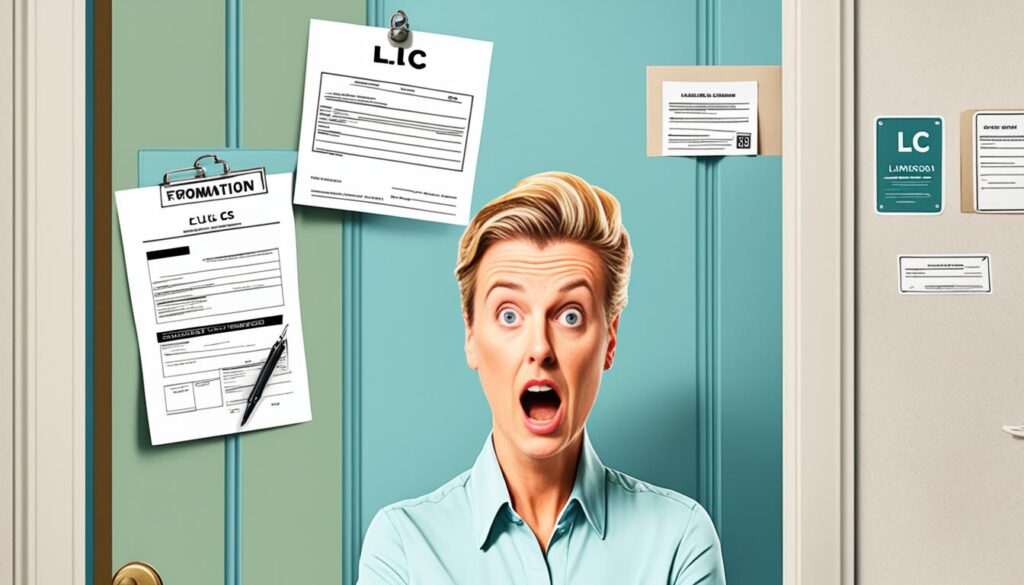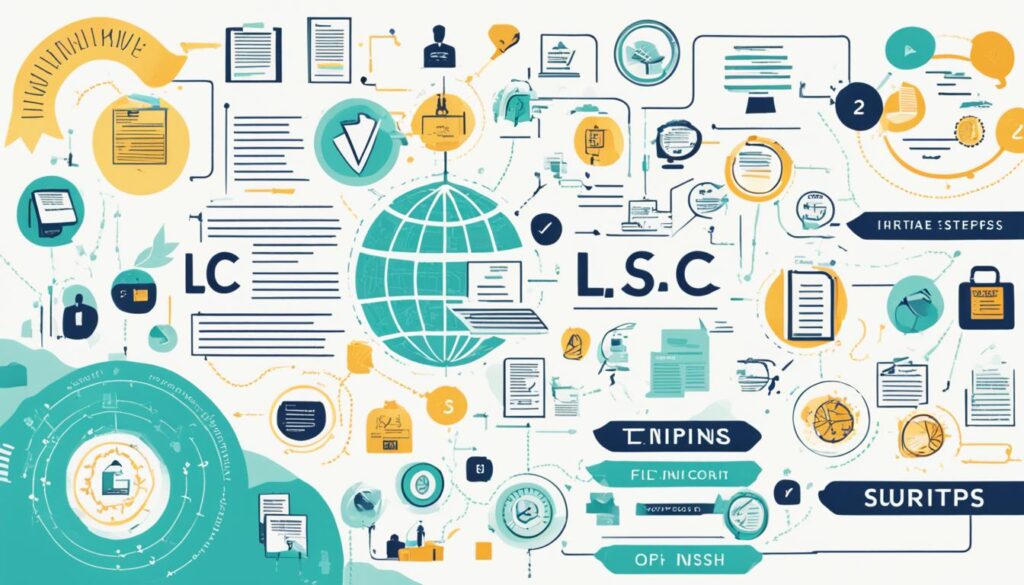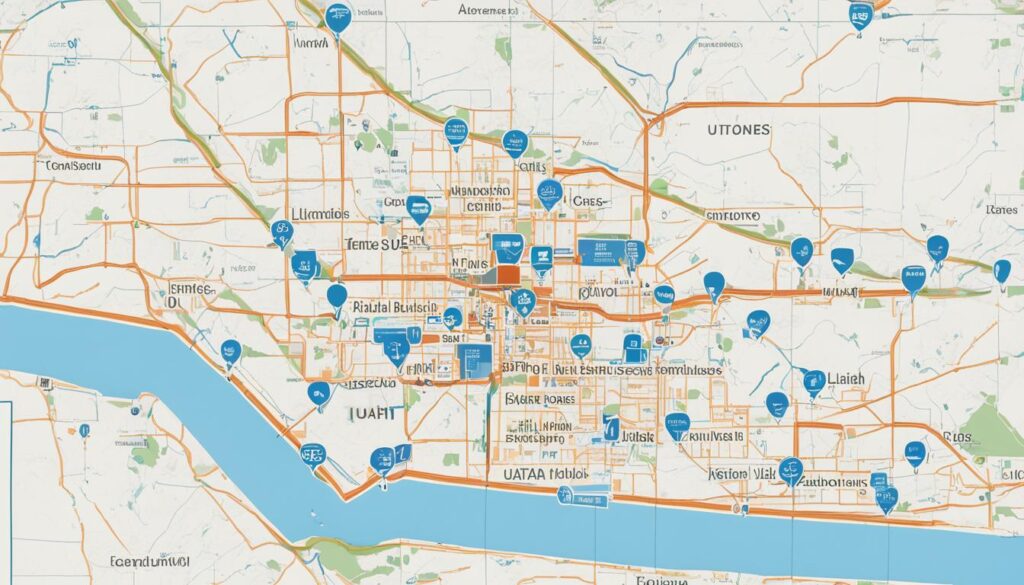Starting a business means dealing with legal stuff, like LLC business licensing requirements. Many people ask if an LLC means they automatically get a business license. The answer is no, but it’s important to know why.
An LLC protects your personal stuff. A business license lets you work in a certain area. These are different things, but both are important for a legal business.
To get licensed as an LLC, you do two things. First, set up your LLC to make your business official. Then, get the right business licenses for where you are and what you do. This keeps you in line with state and local laws.
It’s important to know about LLC license rules to avoid legal trouble. Every place has its own rules, so you should look into them. Not having the right licenses can lead to fines or even closing your business.
Key Takeaways
- An LLC and a business license serve different purposes
- Forming an LLC doesn’t automatically grant a business license
- Most businesses need both an LLC and relevant licenses
- Business licensing requirements vary by location and industry
- Research local regulations to ensure full compliance
Understanding the Difference Between an LLC and a Business License
Starting a business means dealing with legal stuff. You need to form an LLC and get a business license. Let’s look into what these are and why they matter in the LLC licensing process.

What is an LLC?
An LLC, or Limited Liability Company, protects your personal stuff from your business debts. It’s like a mix of corporations and partnerships. To start an LLC, you file Articles of Organization and pay fees.
What is a Business License?
A business license lets you legally run your business in a certain area. Unlike LLCs, business licenses for LLCs come from local authorities. They make sure you follow the rules and can change based on your business type and where you are.
Why Both Are Important for Your Business
LLCs and business licenses are key to your business doing well:
- LLCs protect your personal stuff and offer tax perks
- Business licenses make sure you follow the law and gain trust with customers
- Together, they lay a strong base for your business
Knowing these differences helps you handle the challenges of starting and running a business. Remember, the rules can change, so check your state’s LLC licensing and local business license laws.
The Process of Forming an LLC
Forming an LLC is a key step in starting your business. It involves several important steps to make sure your company is legally recognized and protected.

To begin, you must file Articles of Organization with your state’s Secretary of State office. This document shares key details about your business, like its name, purpose, and how it will be managed.
First, pick a unique business name that meets your state’s rules. Choosing a distinct name is vital for your LLC. Then, name a registered agent who will handle legal papers for your company.
The LLC registration process includes these steps:
- Choose a business name
- Appoint a registered agent
- Prepare and file Articles of Organization
- Pay required filing fees
- Create an operating agreement (optional but recommended)
Some states might ask for more to form an LLC. It’s smart to finish this before you apply for business licenses. You’ll need your LLC’s legal name and type for those applications.
Remember, forming an LLC protects you from personal liability. But, it doesn’t mean you can start operating without permission. You’ll still need the right business licenses and to follow the law in your area.
Do You Get a Business License with an LLC?
Starting an LLC doesn’t mean you automatically get a business license. You must get the right licenses and permits on your own. It’s important to know what licenses you need and when to get them to run your LLC legally.
Types of Business Licenses You May Need
Business licenses depend on your industry and where you’re located. Here are some common ones:
- General business license
- Professional licenses
- Industry-specific permits
- Zoning permits
When to Apply for a Business License
Apply for business licenses after setting up your LLC. This makes sure you’re registered under your LLC’s name. Remember, the cost of LLC licenses changes based on your location and the license type.
The Relationship Between LLCs and Business Licenses
An LLC protects you from personal liability, but a business license lets you legally operate. Your LLC might need federal, state, or local permits. Always check with your local government to find out what licenses your LLC needs.
Steps to Obtain a Business License for Your LLC
Getting a business license for your LLC might seem hard, but it’s easier with the right steps. Let’s go through how to get the licenses you need for your LLC.
First, look into what your business type and location need. Each industry and area has its own rules, so knowing these is key for your LLC.
- Check with federal, state, and local authorities to identify required licenses
- Gather essential documents, including LLC formation papers and EIN
- Complete the license application forms accurately
- Pay associated fees for each license
- Prepare for potential inspections or additional paperwork
Some licenses need to be renewed. Keep track of when they expire to keep your business running smoothly.
By following these steps and staying organized, you’ll make sure your LLC is legal and runs well. If you’re overwhelmed, don’t hesitate to get help. It’s a smart move for your business’s success.
Common Misconceptions About LLCs and Business Licenses
Starting a business can lead to some confusion. Many believe that forming an LLC means you automatically get a business license. This is not correct. LLCs and business licenses are two different things, each with its own purpose.
Some think a business license makes an LLC unnecessary. But these are not the same. An LLC protects your personal stuff, while a business license lets you legally run your business. Knowing both is key to following the law.
It’s easy to assume all businesses need the same licenses. But, the truth is, it depends on your industry, where you are, and what you do. For instance, a New York City restaurant needs different licenses than an online store in rural Texas. It’s important to check and follow all the rules for your LLC to stay out of trouble.
FAQ
Do I automatically get a business license when I form an LLC?
What is the difference between an LLC and a business license?
Why do I need both an LLC and a business license?
How do I form an LLC?
What types of business licenses may I need for my LLC?
When should I apply for a business license for my LLC?
What are some common misconceptions about LLCs and business licenses?
Author
-

David Nguyen is an expert in business licensing, with extensive knowledge in local and international regulations. His expertise is crucial for businesses seeking guidance on compliance and licensing strategies.
View all posts



